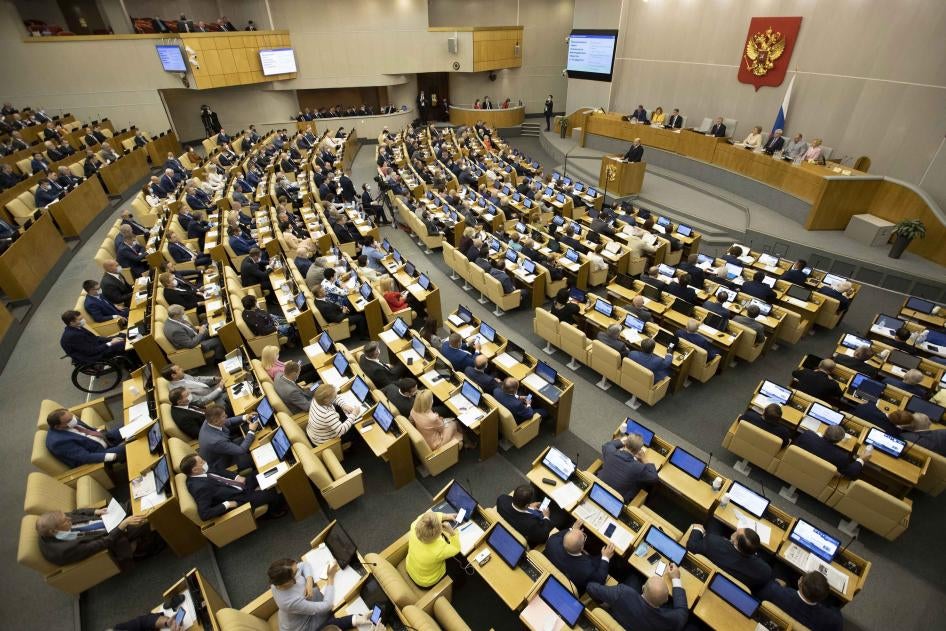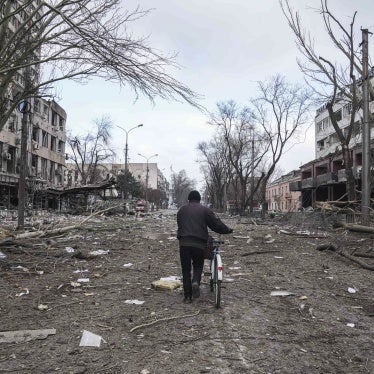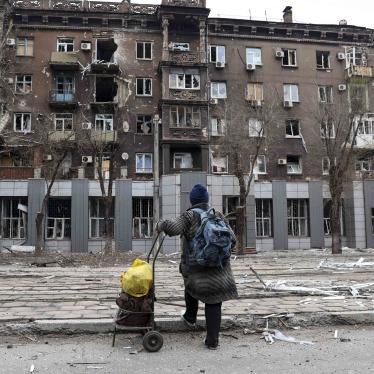(Berlin) – Russia’s adoption on April 28, 2023, of a law criminalizing assistance to foreign and international bodies is an affront to victims of serious crimes, Human Rights Watch said today.
The law prohibits cooperation with international bodies, “to which Russia is not a party,” such as the International Criminal Court (ICC) or any ad hoc international tribunals that may be established to prosecute Russian officials and military personnel, as well as foreign courts. Such cooperation is punishable by up to five years in prison.
“The new law is apparently aimed at further undermining international efforts to secure accountability for crimes committed by Russian nationals, including in Ukraine,” said Balkees Jarrah, associate international justice director at Human Rights Watch. “The law in Russia is a new toxic addition to the growing array of draconian criminal legislation adopted in recent years in the name of ‘state security.’”
On March 17, ICC judges issued arrest warrants for Russian President Vladimir Putin and his children’s rights commissioner, Maria Lvova-Belova. The judges found reasonable grounds to believe that Putin and Lvova-Belova bear criminal responsibility for the alleged unlawful deportation and transfer of Ukrainian children from occupied areas of Ukraine to Russia.
A Kremlin spokesperson denounced the ICC warrants and indicated that Russia does not recognize the court’s authority. Separately, Russian investigators had also opened criminal cases against the ICC prosecutor and the panel of judges charged with the case. On March 25, the speaker of Russia’s lower house of parliament, Vyacheslav Volodin, presented the new law as a response to the ICC’s arrest warrants.
In addition to the ICC, the new law refers to foreign state bodies, such as Ukrainian courts and the District Court of The Hague in the Netherlands, which handed down a long-awaited ruling on November 17, 2022, related to Malaysia Airlines flight MH17, which was shot down over eastern Ukraine in July 2014. The Dutch court convicted two Russian nationals and a Ukrainian in absentia of murder for their role in the downing of the plane. Ukrainian authorities have also been conducting their own criminal investigations into serious crimes committed by Russian forces in Ukraine as part of the Russia-Ukraine war.
Other laws in Russia also criminalize “confidential cooperation” with foreign governments or international organizations deemed contrary to Russia’s broadly defined “state security,” punishable with up to eight years in prison. Repeat offenses of calling for sanctions against Russia are punishable with up to three years.
Another bill, adopted by Russia’s lower house of parliament, the State Duma, in its first reading in December, would provide effective immunity for certain crimes committed in Russia-occupied areas of Donetska, Luhanska, Zaporizka, and Khersonska regions of Ukraine while acting “in the interests of the Russian Federation.”
The new law, adopted in April, is broad and vaguely worded and appears to be designed for selective implementation, which is typical of repressive Russian legislation, Human Rights Watch said. Russian human rights defenders also expressed concern that the law may be used, among other things, to criminally prosecute calls for or assistance to ensure the enforcement of decisions by international judicial bodies in which Russia is not a member, including the European Court of Human Rights (ECtHR).
Human Rights Watch is already aware of four cases in which applicants who had been awarded just satisfaction by the ECtHR for violations of their rights under the European Convention chose to drop their claims in light of the new law.
On March 15, 2022, Russia had pre-emptively moved to withdraw from the Council of Europe before the Committee of Ministers expelled Russia from the organization the next day. Russia then stated it would not comply with any European Court of Human Rights judgments that become final after March 15, 2022.
Later, legislative authorities in Russia outlawed the enforcement of such judgments. Nevertheless, under article 58 of the European Convention on Human Rights, and as confirmed by the court, Russia remains bound by its obligations for violations committed up to September 16, 2022, the date on which Russia ceased to be a party to the convention.
In March 2023, the Council of Europe Committee of Ministers, which is responsible for supervising the execution of European Court judgments, deplored Russian authorities’ refusal to enforce its decisions and emphasized the unconditional obligation to pay just satisfaction awarded by the court to all applicants.
“The adoption of this disturbing law is another move by Russian authorities to systematically stifle any effort to seek justice and deter scrutiny of Russia’s conduct abroad,” Jarrah said. “The international community should publicly make clear that they will remain undaunted in their support for judicial bodies like ICC and will not tolerate Russia’s attempted obstruction of their crucial work.”









